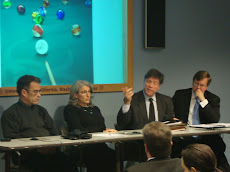from page 125 of the report:
Recent studies have indicated that the current anthrax vaccine is associated with high rates of acute adverse reactions, particularly in women. No information is available on rates of persistent symptoms or multisymptom illness following receipt of the anthrax vaccine. Studies have not identified excess hospitalizations or outpatient visits for diagnosed diseases in the weeks and months following receipt of the vaccine. Limitations in the types of information provided by these studies, however, indicate a continued need for long term follow up, to determine whether excess rates of diagnosed or undiagnosed conditions occur in anthrax vaccine recipients.and from page 127:
Recommendations
Diverse concerns have been raised in relation to vaccines received for the Gulf War, but relatively little reliable information has implicated individual vaccines as prominent risk factors for Gulf War illness. Several issues related to vaccines received by Gulf War veterans have not been adequately addressed by existing research. These include the need for more thorough evaluation of vaccines as risk factors for chronic health problems in epidemiologic studies, a definitive study to conclusively evaluate the previously-observed association between squalene antibodies and Gulf War illness, and the need for longer term evaluation of symptoms and diagnosed diseases following receipt of the anthrax vaccine.
The Committee therefore recommends the following research:
- In previously-conducted and future epidemiologic studies of Gulf War veterans, analyze associations between Gulf War illness and individual vaccines, combinations of vaccines, and total number of vaccines received using methods that control for potential confounding by other Gulf War-related exposures.
- Commission a case-control study to provide clear answers concerning possible associations between Gulf War illness and squalene antibodies. The study should, at minimum, analyze blinded samples from well characterized symptomatic and healthy Gulf War veterans for the presence of squalene antibodies using each of the assays developed for this purpose. It should also assess whether there is an identifiable link between levels of squalene antibodies in ill Gulf War veterans and receipt of the anthrax vaccine or vaccines more generally. The project should be organized and overseen by qualified investigators not affiliated with the federal government or civilian scientists whose initial work raised the squalene issue in relation to Gulf War illness.
- Evaluate the association of anthrax vaccine adsorbed (AVA) with chronic symptoms, Gulf War illness, and diagnosed diseases in personnel known to have received the anthrax vaccine during the Gulf War. These health outcomes should also be assessed at least five years after vaccination in deployment and era subgroups of personnel in the Millenium Cohort study as well as other groups vaccinated in association with the military’s anthrax vaccine immunization program and federal anthrax vaccine trials.
* But what message did the media get when it interviewed RAC members?
LA Times: " the panel... could find no evidence linking it [GWS] to depleted uranium shells, anthrax vaccine and infectious diseases."
US News and World Report: "There are other factors that, while not likely causes of Gulf War illness, can't be ruled out, Steele said. These include exposure to nerve agents, exposure to smoke from oil well fires, and vaccines given to the troops. The panel ruled out depleted uranium and anthrax vaccine as causes.
The Newshour with Jim Lehrer: "James Binns: Many other exposures that were also happening in the gulf at that time, depleted uranium munitions, anthrax vaccines, special paints and solvents that were used, we do say that the evidence does not show that they were significantly connected."
Either the evidence is adequate and reliable, in which case you can "rule out" that exposure as a cause, or you need more evidence and can say very little about whether that exposure may have caused GWS, and in how many veterans. In the case of anthrax vaccine the RAC's chairman and former scientific director are trying to have it both ways. In so doing, they are mirroring behavior of earlier GW scientists and administrators criticized in their report. The committee's work is critically important to help Gulf War veterans, yet flaws of this kind diminish the report's (and committee's) reliability and value to veterans. This is a pity.










1 comment:
THANKS MERYL FOR ALL YOU HAVE DONE FOR THE VETERAN COMMUNITY.
Post a Comment